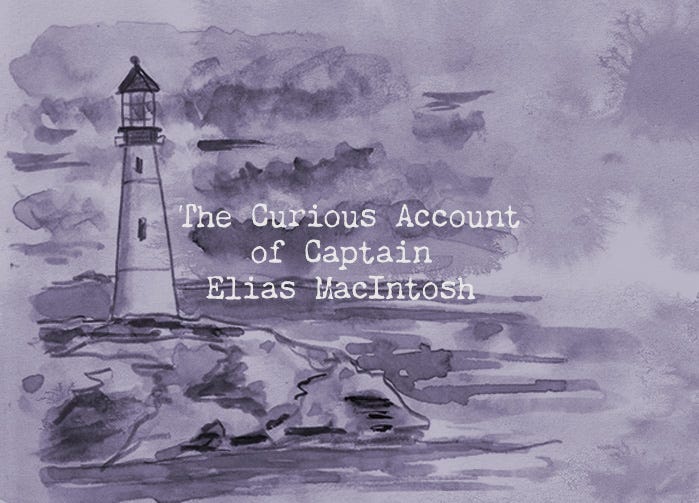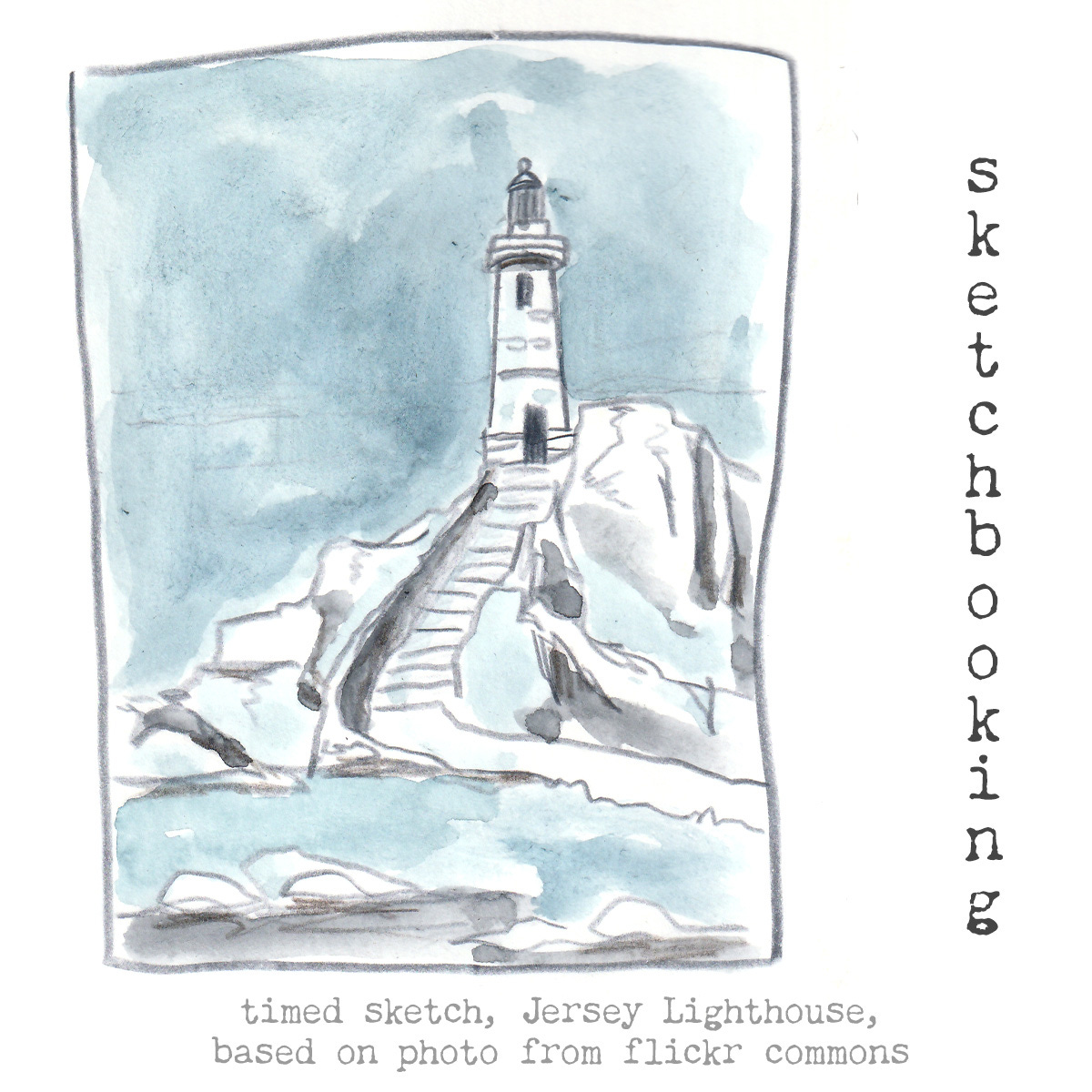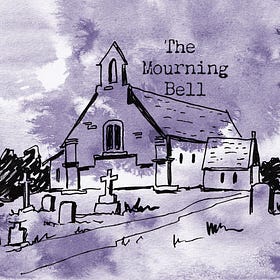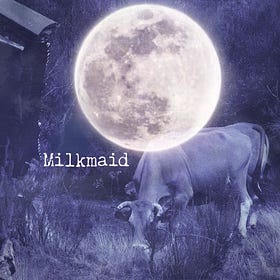The Curious Account of Captain Elias MacIntosh
a short story featuring a lighthouse and creatures from the deep
The 30 Days of Fright challenge (hosted by Wendy Cockcroft) continues. Today I’m going all the way back to Prompt 16: the lighthouse.
Why did it take me so long to post it? I actually started writing it at the beginning of the month, before the prompt even came out! So what gives? I’m too in love with lighthouse stories, I guess, and I wanted it to be special. Plus, I have some illustrations I wanted to share.
Anyway, here it is finally, and I hope it meets with your approval.
The Curious Account of Captain Elias MacIntosh
The most important thing you need to know is that I thought she was dead.
I truly did.
- - -
Those are the first words he wrote. I found the journal open on the desk when we arrived. It took me a bit of work to piece together what happened, or might have happened. As their own government doctor in P— was laid up with a sprained ankle, I was called upon from the next village to join the small group of men sent to the lighthouse, after the storm settled, to find out what had gone wrong. I will let you read MacIntosh’s own words henceforth, just as he wrote them. You may come to your own conclusions.
-Dr. L. Standish
- - -
My mind’s a bit muddled, as you can imagine, after three sleepless nights out on this desolate rock. Of the squelching and the scratching outside at the boarded up windows and the well-blocked and bolted doors. They come in the night.
When I got here and found Jake and young Williams all torn up, and two of those male creatures, human-like, but pale and scaly and mostly hairless, oozing whatever ichor they have that passes for blood, I knew all of them were dead. And that Jake and Williams had put up a hell of a fight. But I’m getting ahead of myself. A man running out of time tends to do that.
Let me start at the beginning.
For two years, the people of the little seaside village watched as ships from the nearby port town of P— ferried materials and workers to and from old Shamrock Isle. Watched the tower slowly take shape, rising from the rocky outcrop in the sea. And they clucked their tongues and shook their heads and whispered in the pub, like a lighthouse was something shameful.
Shamrock Isle. Sounds lucky, don’t it?
When I moved into the village, being one of those hired to run relief and goods out to the keepers who’d be stationed at the new lighthouse, I got the usual welcome an insular community by the sea often gives. Askance looks. A few curt nods. A smile or two that barely reached the lips, let alone the eyes.
Jake Hornsby and the Williams kid got the distinction of being the first keepers on duty.
Poor bastards.
I prised the rifle from Jake’s dead hand and pocketed Williams’ pistol.
The sky was that dusky slate color, and already I felt a few raindrops. I knew more help wouldn’t be sent out that night, with a storm brewing again and the sea already getting choppy. I had run a risk, volunteering to head out here to see what had happened, why the light had gone out. But I knew Jake Hornsby from years back, you see. And I was thinking one of the men had been laid up sick, or a repair needed to be made, that they just needed an extra pair of hands until we could get a relief boat out.
Wishful thinking.
The door was wide open and I went in expecting—I don’t know what. But everything was normal, no sign of a struggle. I dropped my rucksack by a chair, but kept the rifle in hand. Then I thought to check the log. I found it easy enough and the Williams kid’s journal, too.
I flipped through the pages. Typical reports.
In the lad’s journal, a few notes caught my interest, but I couldn’t make heads or tails of it, not until later.
Mr. Hornsby says we needn’t worry. Seals, he says. But I seen something out there in the water, something strange.
We got ourselves a gold mine here. We found it when we was fishing and by God, we’ll be rich when we get it back to the mainland. We devised a way to hold it, but it’s a struggle, I tell you. Damn these storms. When will the relief boat come?
I wondered what sort of treasure they’d found, but honestly, I wasn’t real interested in money right about then.
I went back outside to take another look around.
Maybe I got the beginning of my story wrong, though, and none of that’s important. Maybe my story starts when I found her lying on the shore.
She was on her belly, on the rocks, not too far from the waterline, her head resting in profile, eyes closed, her too-long arms stretched out as if she’d been crawling toward the water. Her pale skin was scaly, but she was different from the male ones. More human-looking, she was.
Absurdly, she made me think of my sweet Lizzie, God rest her.
Maybe it was something about the dark auburn hair and pale skin. The small nose and lips that looked like they were about to smile, even in death.
I didn’t want to look at her, naked like that, and reminding me of my own Lizzie, but I had already noticed the fine webbing between her fingers and toes and the ridge-like fin along her backbone before I looked away.
What could I do? I got a sheet from the house. I wrapped her in it best I could and carried her back up the slope. She was much smaller than the creatures that took out poor Jake and Williams. She was lighter than I expected, too. Did she have hollow bones like a bird? Or cartilaginous bones like sharks?
Maybe the females are more human-looking, like the mermaids of lore, so they can entice foolish men to their doom. Or I’m just being fanciful.
Her head lolled and her wet hair dangled and I felt the clammy skin of her arm up against mine as I carried her. I thought about Lizzie’s cold, clammy skin when she was sick with fever. I thought it was some sort of sick, sad justice maybe, that I had to bear the burden of this wretched creature now, out here, all on my own.
I covered the men’s bodies, and those male creatures, too, with a tarp and weighted it down good against the coming wind. That might sound callous, but I needed to keep them for evidence. I said a short prayer over them and left it at that.
Like I said, the next bout of the storm was coming.
But the fish-maid, that’s how I started thinking of her, I couldn’t just leave her, not reminding me like she did of my own sweet daughter. So I dug a shallow grave out behind the house—you can’t dig a deep grave out here as it’s mostly rock—and gave her a proper funeral like. I admit, I even hummed a hymn. That one my wife Eliza always liked—God rest her soul now, too. I was never much of a religious man, so I remembered the tune more so than the words.
That’s probably not important, is it?
It was grown dark by then, on account of both evening and the squall, and me not knowing any better, I got a few hours of shut-eye despite the rain and wind buffeting the windows. I couldn’t fix the light alone and I couldn’t go back.
I woke once in the night to an ungodly shriek, rising and catching the air, even above the storm.
First, sitting up in bed, coming out of sleep, I thought it was my Lizzie, yelling out in a fever dream. Then I realized where I was, and when I was, and scrambled out of bed.
I nearly burst outside with a lantern, until I remembered those creatures and the fate of Jake and Williams, slashed apart. I stayed inside the lighthouse. I peered out the windows into the dark. The sound didn’t come again.
But I didn’t go back to sleep.
You don’t think I sound shaken up enough, do you? Creatures more fish than man shredding up my mates, and a fish-maid dead on the beach, and ungodly wailing in the night. You know when you see something horrible, like a man killed by a train, or a child trampled by a horse, you start to function automatically, like one of those wind-up toys. You go and go and go for a while, until suddenly, you just stop. Run out of momentum. I guess it’s like that.
I’m winding down, I think.
One evening, early on in the village, I was sitting in the dining room of the boarding house, when the barmaid spoke to me. “What’re you doin’ stayin’ over here, instead of in the big town? Nothin’ worth movin’ here for,” she added, wiping her hands on her apron. “It’s a quiet village.”
“I like the quiet,” I had said.
Now, out here, it’s too quiet. I can hear the wind picking up and a few patters of rain again at the windows, but I can’t hear them. Maybe that brief lull in the storm made them fall back. They seem to like to come under the cover of storm and darkness.
The sun can’t come up fast enough.
Let me get back to my tale. Where was I?
Oh, yes, I buried the fish-maid nice and proper, and the next morning, when I went out to survey the storm damage under the grey-light sky, the mist hanging heavy, she wasn’t there.
No, I mean it. The dirt was disturbed, like, well like something crawled out of that shallow hole I’d dug. It was empty. It was too muddy around to tell much, except that something had moved off, dragged itself, toward the shore, toward the sea.
I swear I thought she was dead.
I thought of that lonely, unearthly shriek in the night.
The other dead bodies were still under the tarp that first morning. I checked. It wasn’t until the second morning that the bodies of the male creatures disappeared in the night, reclaimed by their kin I suspect.
And my boat? I found what was left of that. Torn up. Dashed against the rocks in the storm I thought. Sabotaged, I reckon now.
I’m getting long winded, but I suspect this will be the only record of what happened here, after I’m gone.
So maybe I should’ve started my tale the night the light was lit in the new lighthouse for the first time. The barmaid leaned close and said, “No good’ll come o’ that, I’m afraid.”
“Shipping is picking up from P—-,” I said. “They’ll need the light.”
“Been fine over on this side o’ the rock without no light for ages,” she replied. “Better than fine,” she said. “We’ve got an agreement and some ain’t gonna like the change.”
I didn’t ask who she was talking about. I figured it was a group of locals and the last thing I wanted to do was get involved in local politics.
I guess you can say I’m “involved in local politics” now, whether I like it or not. Sitting in this deserted, dark lighthouse with the windows boarded, writing this and waiting for whatever kind of retribution these creatures want to dish out to me for… what? For being human? For being part of the government that built this damn spire? For burying that poor fish-maid that wasn't dead when I thought she was?
What was that? I heard something. I’ll be back. I hope.
It was just the banging of a loose shutter. I’m too jumpy now. I take the rifle everywhere with me, and try to stay indoors. Last evening, I went looking out the upper windows. I thought I saw a ship coming from P— to rescue me, but it disappeared in the mist and never showed again. Maybe it had to turn back. Maybe it was my mind playing tricks.
Maybe those fish-things got ‘em.
Yesterday, I got to wondering if there was something useful in the shed, something for emergencies, like flares or extra weapons, rope. It wasn’t even locked. In fact, the door was busted open, from inside it seemed. I wished I had thought to look in the shed earlier.
I didn’t expect what I found, on two counts. One: there was a dinghy, brand new. Just maybe I could get off this rock, depending on how many of those creatures were out there.
The second thing I discovered was… well, something I wish I hadn’t. A metal tank, filled with dirty water. Some of that ichor congealed on the edge of the basin, some pale scales floating on the surface. Strands of wet auburn hair, like Lizzie’s.
It made sense now, what Williams had written: We found it when we was fishing and by God, we’ll be rich when we get it back to the mainland. We devised a way to hold it, but it’s a struggle, I tell you.
It was her.
They had kept her here—a prisoner. Her kin had come looking for her, I reckon, and Jake and Williams got into it with them, paid a price for what they’d done.
But she had busted her way out, maybe after they were dead. Crawled toward the beach with the last of her energy. Where I’d found her. Sick and exhausted, but not…
I thought she was dead. I buried the poor creature. I felt sick.
But how was I to know? It’s not as if I could call a doctor when I found her lying on the shore, you know?
I could’ve called the doctor for my sweet Lizzie, though. I can still hear Eliza weeping and shouting, “Why didn’t you call for the doctor?”
But I was just sitting back in the chair by her bed, my head propped up in my hand, hiding my tears even though no one was there to see. I had checked. I thought she had stopped breathing, that she was finally at peace.
But Eliza came and she could feel the ghost of Lizzie’s breath. The weak pulse that my rough hands had missed.
By the time the doctor arrived, it was too late. He said there was nothing he could’ve done regardless, but Eliza held it against me anyway. She left me a month later, and now she’s dead, too, of the typhoid not a year after.
I suppose you don’t need to hear about that, but now it’s off my chest, as they say. I mentioned how that fish-maid reminded me of Lizzie, didn’t I?
God help me, I thought she was dead. Truly, I did.
Today I’m taking the dinghy out, now that the sky is gaining light, and I’ll hope that I make it to the village, but I don’t really expect to. I don’t know how many of those creatures are out there, how active they are during the daylight. I’ll take my chances on the water.
If they do get me, I hope it’s her—the fish-maid—leading the charge. I hope she looks me in the eye. I’d like to see her again, alive, with shining blue eyes like sunlight on the water and her almost-smile and auburn hair flowing round her shoulders like Lizzie’s.
Maybe if she looks in my eyes, she’ll know I tried to do right by her. Maybe she’ll forgive me for what I’ve done.
But do I deserve it?
I’m leaving this rock now. The sea is leaden and cold. Yet there’s life in it.
You’d do best to remember that.
My advice: don’t re-light the tower. Abandon this cursed place.
Signing off now, and may God and the sea have mercy on me,
Captain Elias MacIntosh
- - -
That’s how the journal ends.
I looked up at the sailor who was reading over my shoulder. “What d’you think, Doc? Some kind of latent madness? Or was it some sudden burst of insanity?”
“Madness?” I said, closing the book.
“Well, we’ve got Hornsby’s and Williams’ bodies,” he said. “And this—” He waved his hand at the journal. “When we find ‘im, we’ll have to bring ‘im in on charges of murder, I reckon.”
“I don’t think so.”
The man scoffed. “You don’t believe his story, do you, Doc?”
I laughed a thin laugh. “I didn’t say that.” I slid back the chair and stood up, the journal tucked under my arm.
“But you won’t find him.” The sky outside was growing grey. Grey as always, I thought. Just variations of grey. “I think he’s dead,” I said. “I truly do.”
Sketchbook
Further Reading
In case you missed them, here are two of my recent posts for the 30 Days of Fright writing challenge.
The Mourning Bell
I'm very fond of this gothic story about a mother and daughter whose time is limited.
This is the Shrouded Grouse, and here you’ll find supernatural short stories and novellas, essays and musings, zines, and illustrations that explore the liminal spaces and moody places.
Thanks for taking the time to view my work. Every view and like and comment inspires me to keep going. If you decide to subscribe below, make sure you check your promotions tab or spam for my Welcome Email.











Just wonderful! I’ve been kicking around my own mermaid story for years. This one does everything such a tale should, in rich layers.
This really is excellent. I love the Captain character, he's so believably human. As for the rest, it adds another stone to the edifice of Lovecraftian lore. Great job!